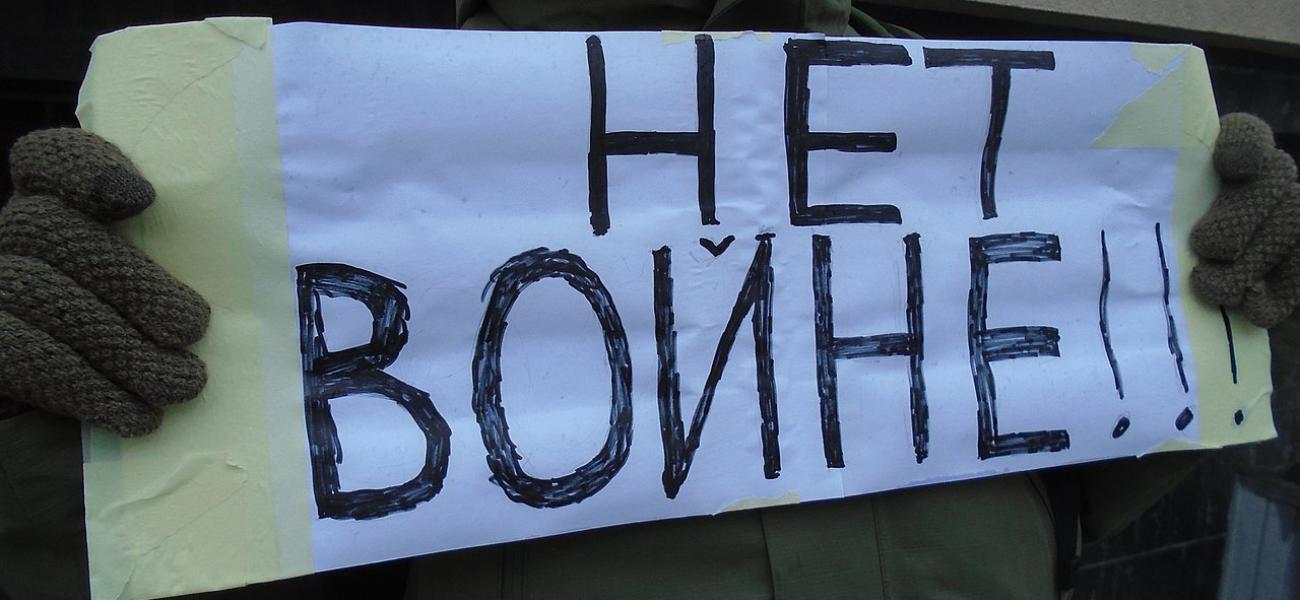In the Thick of It
A blog on the U.S.-Russia relationship
Defections Shake Up Russian State Media
Putin’s Russia, among other things, is held together by tamed and loyal journalists who are often aware of its faults but keep working for money, fame and/or love of the regime. The audacious recent anti-war protest by a producer on state-run Channel One television during a live news broadcast is a sign that this part of the regime’s toolbox may be getting the worse for wear. (Though this does not mean that years of Kremlin spin can easily be undone.)
What could happen from here?
In the 2000s the economic boom and a relatively liberal political climate allowed the coexistence of pro-Kremlin and independent media. Putin’s aide Alexey Gromov would regularly meet with top media dogs to wield control over the narrative. Although Gromov did not typically issue blacklists or direct orders to ban particular voices in the 2000s and early 2010s, journalists developed a knack for adekvatnost’—the ability to sense the appropriate and avoid potentially problematic topics without unacceptably (in their view) degrading the quality of the end product.
But there was still the problem of journalists who were interested in investigating and exposing corruption. So, last year, likely in preparation for the invasion of Ukraine, dozens of investigative journalists were put on a list of “foreign agents” with the aim of shutting them up.
The invasion of Ukraine on Feb. 24 was surprising for many who work in the state-affiliated media. Just like other Russians, they were not aware of the Kremlin's plans. Nevertheless, trained to be part of a well-oiled machine they kept working “as usual.”
What producer Marina Ovsyannikova did during the evening news on March 14 was just one sign that the journalistic community is far from unified by the “special military operation” and doesn't buy into its narrative, at least not wholesale. (Interesting to note: Ovsyannikova studied at university together with Margarita Simonyan, head of RT and the icon of Russian propaganda, who has been one of the main voices justifying the invasion.)
The war in Ukraine brings up three issues for the media in Russia: liability, financial costs and stricter self-censorship.
1. Liability. The looming prospect of an international tribunal has raised the stakes. How long can journalists be part of a criminal industry? They can’t claim that they were not aware of the crimes because they had access to information from Western media.
Ovsyannikova’s protest and statement appear to represent—or coincide with—a tipping point for several notable media personalities. Sergey Brilev, the top news presenter on state-run VGTRK (who happens to be a U.K. citizen) is rumored to have left the channel, despite the official reason for his absence being a “long business trip.” Presenter Liliya Gildeyeva, from NTV, crossed the border and then filed her resignation, reportedly afraid not to be “allowed to leave” Russia. Channel One top manager Zhanna Agalakova, who worked for the company for more than 20 years, has resigned and told reporters in Paris this week that she did so “specifically because the war started.” Russian journalist Roman Super broke the news of an exodus of low- and mid-rank staff from VGTRK; although we can’t verify this yet via different channels, it is quite plausible that many people don't want to cross a new ethical line.
2. Money. Most rank-and-file staff in state-run media are not well paid, with mediocre salaries by Moscow standards. There’s a lot of people dreading Western sanctions biting as inflation goes up. This might become another reason to revolt (or just leave).
3. Stricter self-censorship. The invasion of Ukraine has heightened censorship and leaves journalists even less room for creativity. Prior to this, they could skirt state censorship and make decent programs not related to politics. This ends now, and the disappearance of Russia’s most loved TV presenter, Ivan Urgant, from Channel One is a sign that TV will be boring as hell.
So where does Russian media go from here? We see two possible scenarios linked to Ovsyannikova’s actions—one positive, one negative.
First, the negative: More and more journalists jump out of the propaganda machine, leaving it to the least competent and most cynical to keep working there. We see today that the pressure on journalists has increased immensely and many are taking the propaganda side more actively. Creativity will be washed away and Russian state media will get even worse content-wise. It will probably look like this:
(This drop in quality will attract—or retain—older audiences, who are less attractive to advertisers; and the advertising market will shrink anyway because so many Western companies are divesting, so the pay stays meager.)
The possible positive outcome: Journalists sense the potential of protest and either openly or covertly push the opposition agenda. This will hardly be a mass uprising but might buoy dissenting attitudes. This is the least likely of scenarios for now, but it will become increasingly plausible if/when the state initiates mass physical repressions against dissenting voices amid the collapsing economy. In any case, a lot depends on the effect Western sanctions will have on Russian society as a whole, though it is not worth expecting journalists to be the trigger of regime change.
Ilya Yablokov is a lecturer in journalism and digital media at the University of Sheffield. He is author of “Fortress Russia: Conspiracy Theories in the Post-Soviet World” and “Russia Today and Conspiracy Theories: People, Power and Politics on RT” (with Precious Chatterje-Doody). @ilya_yablokov
Elisabeth Schimpfössl is a visiting fellow at the London School of Economics and a senior lecturer in sociology and policy at Aston University, Birmingham, where she teaches media sociology. She is the author of “Rich Russians.” @elisabethschimp
Both authors have spent a decade studying Russian journalism and journalists.
This post was adapted from an earlier Twitter thread by Ilya Yablokov. The opinions herein are solely those of the authors.
Photo by Vyacheslav Kirillin shared under a Creative Commons license.

